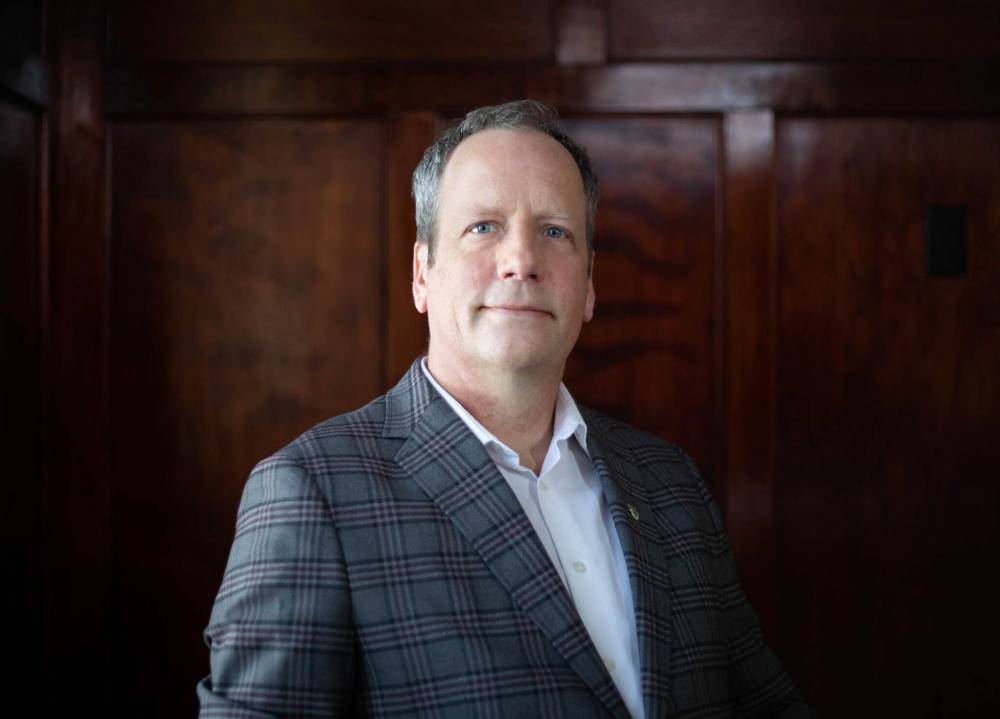A growth fee is once again up for debate at Winnipeg City Hall, but the mayor says he won’t support the controversial levy.
Coun. John Orlikow, who represents River Heights-Fort Garry, is raising a new motion for the city to study the addition of a development fee or charge, also known as a growth or impact fee.
The councillor said he’s interested in a citywide fee, which would apply to both new and mature neighbourhoods.

JESSICA LEE / FREE PRESS FILES
Coun. John Orlikow, who represents River Heights-Fort Garry, is raising a new motion for the city to study the addition of a development fee or charge, also known as a growth or impact fee.
“First of all, growth has to help pay for growth, especially with all these new (zoning changes to streamline development) that the developers are getting. The neighbourhoods are going to be growing, especially River Heights-Fort Garry. We need to get some investment in here to (build infrastructure) so we can accommodate that growth,” said Orlikow.
The City of Winnipeg added an impact fee in 2017, which had been championed by then-mayor Brian Bowman. In 2020, a judge ordered the city to stop collecting the fee and pay back the roughly $32 million of revenue it had raised. The judge concluded the fee was an “invalid indirect tax.”
Developers had raised the successful lawsuit that contested the fee, which added $5,249.96 per 1,000 square feet to the price of a new home in some new neighbourhoods by 2020.
Despite that history, Orlikow said it’s time to determine how a different version of the fee could be added. He noted the judge found fault with the way the city had levied the fee but also ruled the municipal government did have the authority to impose one.
“The bylaw that we provided before was too open-ended. By rejigging it to (ensure) investment is (made) in the ward in which development occurs and has direct benefit to the developer, such as fixing a street or park or community centre… (it would be) legal,” said Orlikow.
The councillor says mature neighbourhoods also need new revenue to address infill builds, since aging infrastructure needs to be replaced.
“Right now, we’re tearing down things more than we’re putting up. We have roads that are falling apart, we have pipes that are falling apart,” he said.
Orlikow said he believes developers could absorb the new charge without increasing home prices because they will save money due to recent zoning changes the city approved to attract more housing development. Those changes will make more housing projects permitted without the need for potentially expensive applications.
Supporters argue the levy is needed to ensure new development pays for the demands it creates on city infrastructure and services.
Orlikow said addressing that issue is increasingly important as the city strives to attract new housing development by using $122 million it recently received from the federal government’s Housing Accelerator Fund.
Mayor Scott Gillingham says he would not support adding the fee.
Gillingham said a federal minister recently confirmed cities that increase growth fees would jeopardize their Housing Accelerator funding and a potential future share in a $6-billion federal program meant to help fund roads, pipes and other infrastructure that supports new homes.
“At this time, with the federal financial incentives on the table and available to the City of Winnipeg, I have no interest in entertaining a development charge,” he said.
Since developers passed on the previous impact fee to homebuyers, the mayor said he’s concerned adding a new version of the levy would undermine efforts to ensure homes are affordable.
“Right now, we are trying very hard to ensure that we are maintaining affordability for our property owners,” said Gillingham.
Lanny McInnes, president of the Manitoba Home Builders’ Association, said he’s still reviewing the motion but has some concerns.
“The federal government, the provincial government and the mayor (are) looking at how… we deal with affordability of housing. Taking steps that would be counter to that, I’m not sure this is the right time for that discussion,” said McInnes.
He said home prices reflect any additional cost to builders, including fees.
McInnes stressed developers already cover the cost of growth in new neighbourhoods.
“In new communities, developers pay for all the infrastructure… everything from each blade of grass to every pipe, road, stop sign, traffic light, fire hydrant (and) signage,” he said.
Council’s property and development committee will consider Orlikow’s motion within the next month. If approved, a report with development fee options would return in about six months.
joyanne.pursaga@freepress.mb.ca
X: @joyanne_pursaga

Joyanne Pursaga
Reporter
Joyanne is city hall reporter for the Winnipeg Free Press. A reporter since 2004, she began covering politics exclusively in 2012, writing on city hall and the Manitoba Legislature for the Winnipeg Sun before joining the Free Press in early 2020. Read more about Joyanne.
Every piece of reporting Joyanne produces is reviewed by an editing team before it is posted online or published in print — part of the Free Press‘s tradition, since 1872, of producing reliable independent journalism. Read more about Free Press’s history and mandate, and learn how our newsroom operates.
Our newsroom depends on a growing audience of readers to power our journalism. If you are not a paid reader, please consider becoming a subscriber.
Our newsroom depends on its audience of readers to power our journalism. Thank you for your support.